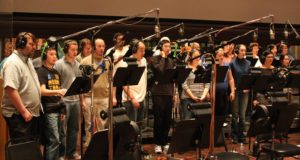About the Music
History
 The dramatic oratorio, Choose Life, Uvacharta Bachayim, draws on Jewish and Christian music and scripture, as well as the writings of Holocaust survivors, to create an interfaith commemoration of the Holocaust. It was composed during Mona Lyn Reese’s 1993-94 Faith Partners Residency sponsored by the American Composers’ Forum and the Otto Bremer Foundation. The residency included the Basilica of Saint Mary, Temple Israel, and the College of St. Benedict, all located in Minnesota. Delores Dufner, OSB, was commissioned by the Faith Partners to create the libretto.
The dramatic oratorio, Choose Life, Uvacharta Bachayim, draws on Jewish and Christian music and scripture, as well as the writings of Holocaust survivors, to create an interfaith commemoration of the Holocaust. It was composed during Mona Lyn Reese’s 1993-94 Faith Partners Residency sponsored by the American Composers’ Forum and the Otto Bremer Foundation. The residency included the Basilica of Saint Mary, Temple Israel, and the College of St. Benedict, all located in Minnesota. Delores Dufner, OSB, was commissioned by the Faith Partners to create the libretto.
The piece was an immediate success. Choose Life filled 1500-seat auditoriums and received spontaneous standing ovations at every concert. Reese and Dufner received numerous requests for scores and inquiries regarding future performances. Most requested was an orchestrated version of the work.
The Otto Bremer Foundation subsequently gave Reese a grant to write the symphonic version of Choose Life, which was premiered by the Billings Symphony & Chorale, Uri Barnea, Music Director, in November of 1996. Choose Life has received national acclaim and was nominated for a Pulitzer Prize in 1995. Teri Larson, director of music at the Basilica of Saint Mary, says:
“To say this work is powerful is an understatement. It is earthshaking and profound.”
Choose Life combines solos, choruses, and a narrator. Gregorian chant, polyphonic motets, Anglican verse and choral anthems, Jewish modes and hymnody, recitative, and Klezmer music blend to create the score. The music and text express bitterness, anguish, anger, our sorrow and need for comfort, our will to overcome evil, and our determination to choose life over death. The readings were selected from Holocaust survivors’ writings. Choose Life is staged with singers in costumes, minimal sets, lighting, and choreography.
In every performance of Choose Life, many listeners are greatly moved not only by the music but by the power and beauty of the libretto. Dufner’s libretto gives Choose Life its power to inspire and empower a more compassionate society. Her poetry has strong images and sublime rhythm and each word is balanced within the context of the libretto. Her work avoids pedantry and includes avenues for listeners to access their own spirituality.
Reese, Dufner, and all conductors have received hundreds of letters from audience members and performers whose lives have been touched by their work. The anguish of the world and the compassion of humanity come together in this skillful weaving together of poetry and music of different cultures and styles.
